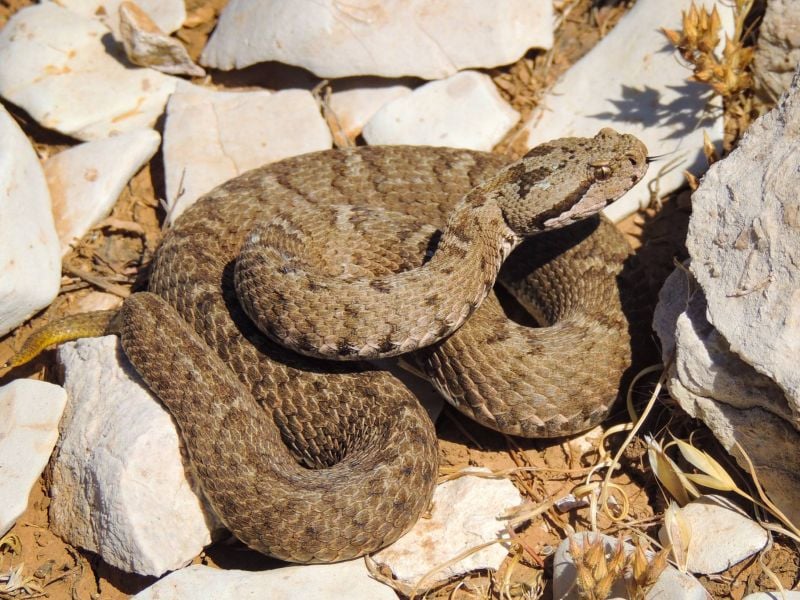
The highly endangered Lebanon Mountain Viper, one of three highly venomous snake species native to Lebanon. (Courtesy Rami Khashab/Lebanese Wildlife)
Lebanon is experiencing record-breaking temperatures this summer, pushing many to escape the heat in the mountains. The country offers hundreds of miles of world-class hiking trails and nature reserves, but these are, of course, shared with the resident wildlife.
Some of the most (needlessly) feared wild creatures are snakes.
To learn which snakes are harmless and which require added caution, L’Orient Today spoke to Rami Khashab, a co-founder at Lebanese Wildlife with years of experience with Lebanese herpetofauna — that is, reptiles and amphibians.
Herping – with caution
Twenty-five different snake species are indigenous to Lebanon, though new species are discovered now and again, Rami explains.
These 25 species can be divided into three categories: non-venomous (17 species), mildly venomous (five species), and highly venomous (three species).
Lebanon's mildly venomous snakes are “rear-fanged,” meaning their fangs are located deep in their jaw. Their venom is of relatively low toxicity, meaning a bite would not be deadly to humans. However, a visit to the hospital is recommended regardless.
The three highly venomous species — the vipers — warrant a bit more attention.
Lebanon is home to the Palestinian Viper, the Lebanon Mountain Viper, and the Blunt-Nosed Viper. A bite from any of the three can be deadly and, in all cases, requires immediate hospitalization.
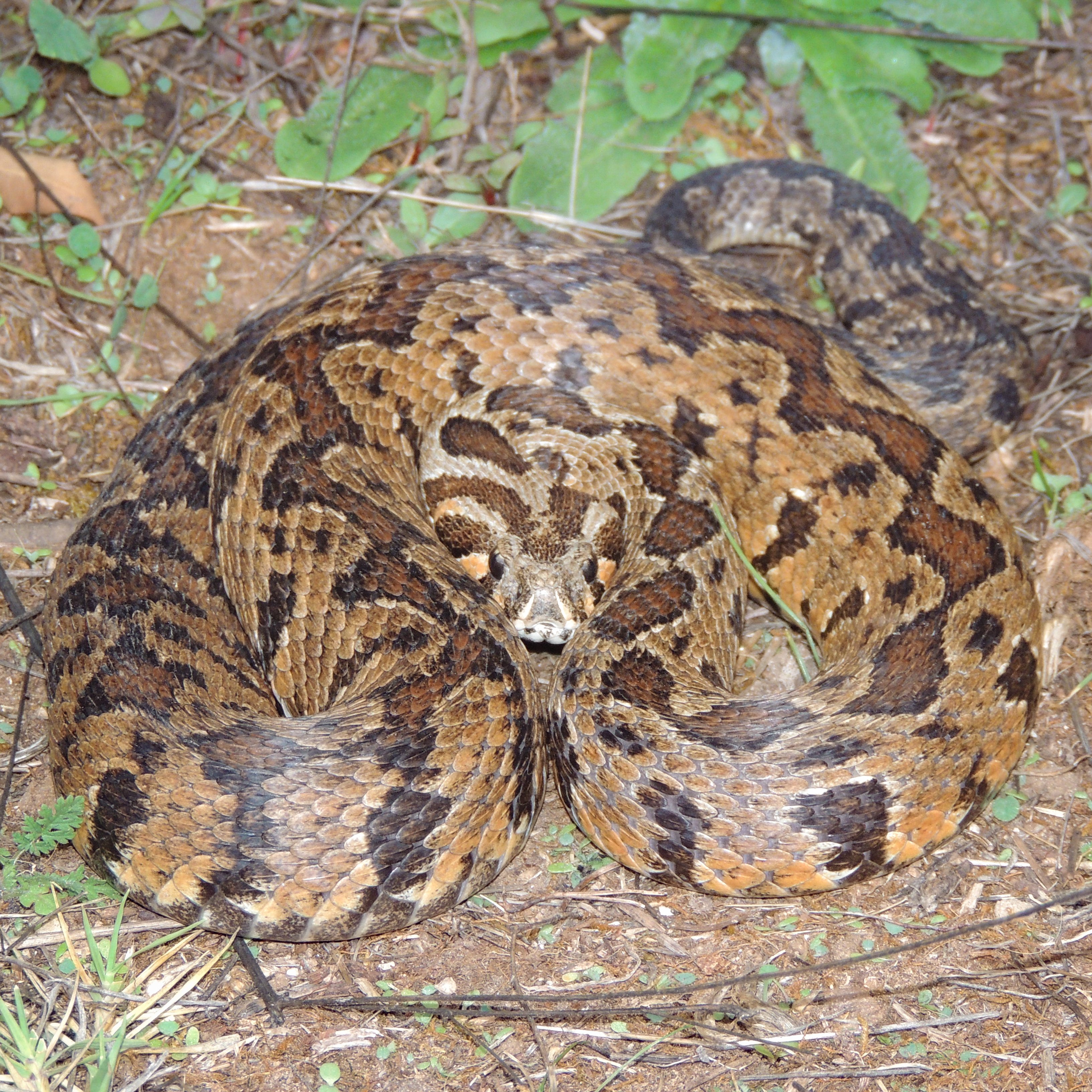 The Palestinian Viper is Lebanon's most common and most widely-distributed highly venomous snake. (Courtesy Rami Khashab/Lebanese Wildlife)
The Palestinian Viper is Lebanon's most common and most widely-distributed highly venomous snake. (Courtesy Rami Khashab/Lebanese Wildlife)
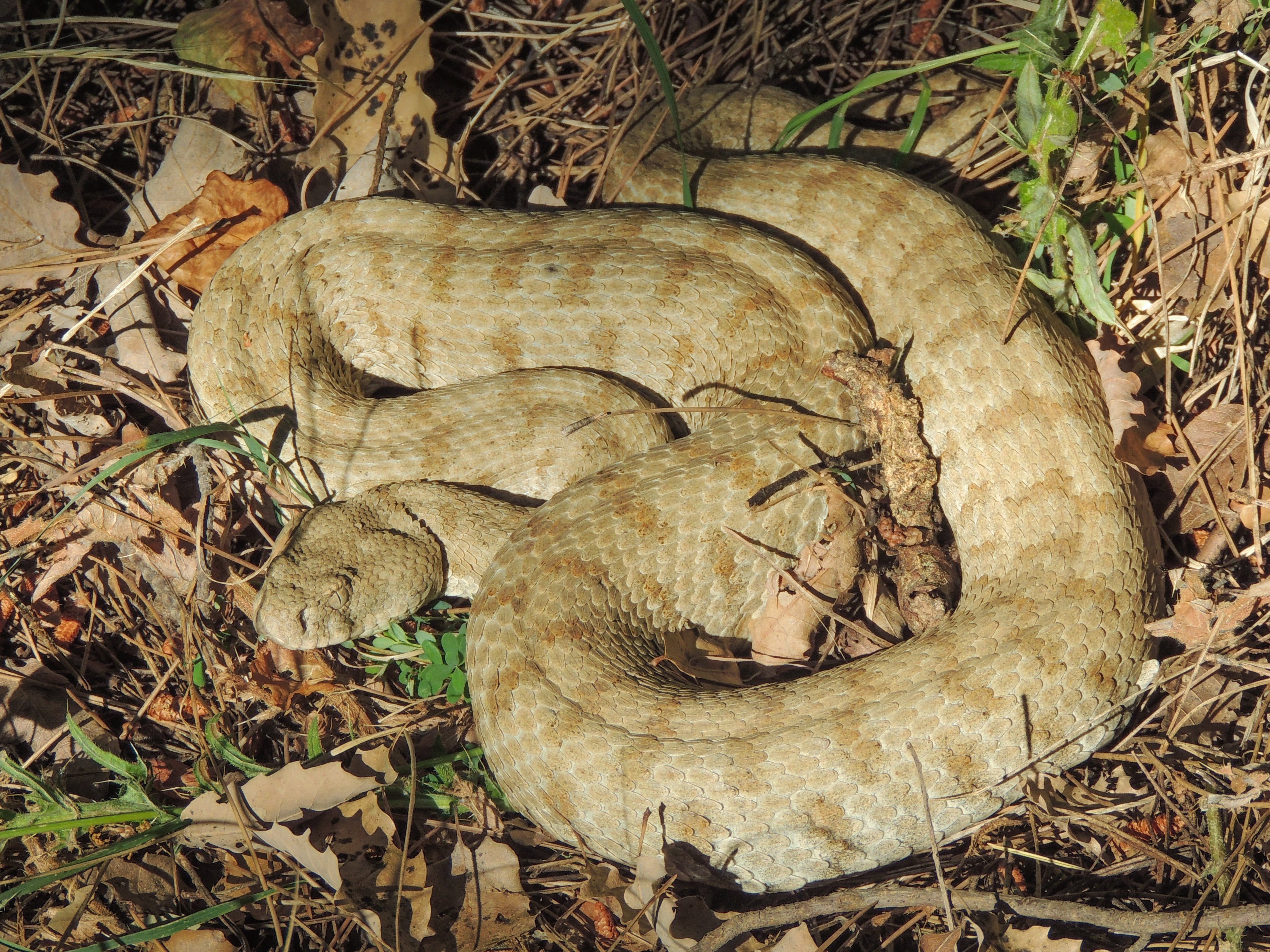 The Blunt-Nosed Viper, though the biggest of Lebanon's three vipers, is the most shy. (Courtesy Rami Khashab/Lebanese Wildlife)
The Blunt-Nosed Viper, though the biggest of Lebanon's three vipers, is the most shy. (Courtesy Rami Khashab/Lebanese Wildlife)
“The Palestinian Viper is the most common and most widely distributed [throughout the country], which can make it the most dangerous of the three vipers found in Lebanon,” explains Rami.
The Palestinian Viper can be found in the southern half of the country, Mount Lebanon and the north, and lives at altitudes of up to 1,600 meters.
“It’s also quite a curious snake. It gets close to human residences in search of food, especially if there is something that attracts rodents or birds,” says Rami. “This increases its chance of encounters with humans and, in most cases, the snake gets killed.”
“But it also increases the chances of people being bitten, especially if they act irresponsibly by trying to catch the snake without knowing the species,” he continues.
By contrast, the Blunt-Nosed Viper, though the biggest of the three vipers, is the shyest. Though absent in the south, they can be found from the Mount Lebanon area up to Akkar in the north.
This viper seeks isolation in dried river beds or tree-covered areas, so bites are quite rare.
 L'Orient Today joined Rami for one of his herping outings. Credit: João Sousa/L'Orient Today)
L'Orient Today joined Rami for one of his herping outings. Credit: João Sousa/L'Orient Today)
Lastly is the Lebanon Mountain Viper, an endangered species of snake endemic to the Levant. As its name suggests, this viper lives at high elevations — at or above 1,700 or 1,800 meters above sea level.
L’Orient Today joined Rami to search for this type of viper one day in July. This pocket in the mountainside, he explains, is a mountain viper hibernacula — a place where the snakes seek refuge.
“It’s almost guaranteed we find a viper here,” says Rami.
The act of searching for amphibians and reptiles in the wild is called herping, from the word “herpetology.” Rami runs an Instagram account and YouTube channel called Herping Lebanon, which he uses to educate the public about how to best respect these creatures.
Unfortunately, on this particular day, there are no vipers to be found. But if you do happen across one, keep reading.
What happens if I’m bitten by a viper?
Whether or not a viper bite is deadly can depend on a number of factors: the location of the bite, how much venom the snake managed to administer, the age of the victim (children and elderly are more vulnerable) or any pre-existing health conditions the victim may have.
If you are unlucky enough to be bitten by a viper, there are a few things you definitely shouldn’t do.
First, don’t bother trying to suck the venom out. It’s impractical and ineffective, says Rami. The toxins are already in your system and, if you happen to swallow the venom or have even a minor cut in your mouth, you’re going to have added complications.
Also please don’t use a pocket knife to open the puncture wounds further — this will be equally ineffective and sounds like a thoroughly unpleasant experience.
Definitely do not tie off the limb that was bitten. This will only restrict blood flow and increase your likelihood of losing that limb.
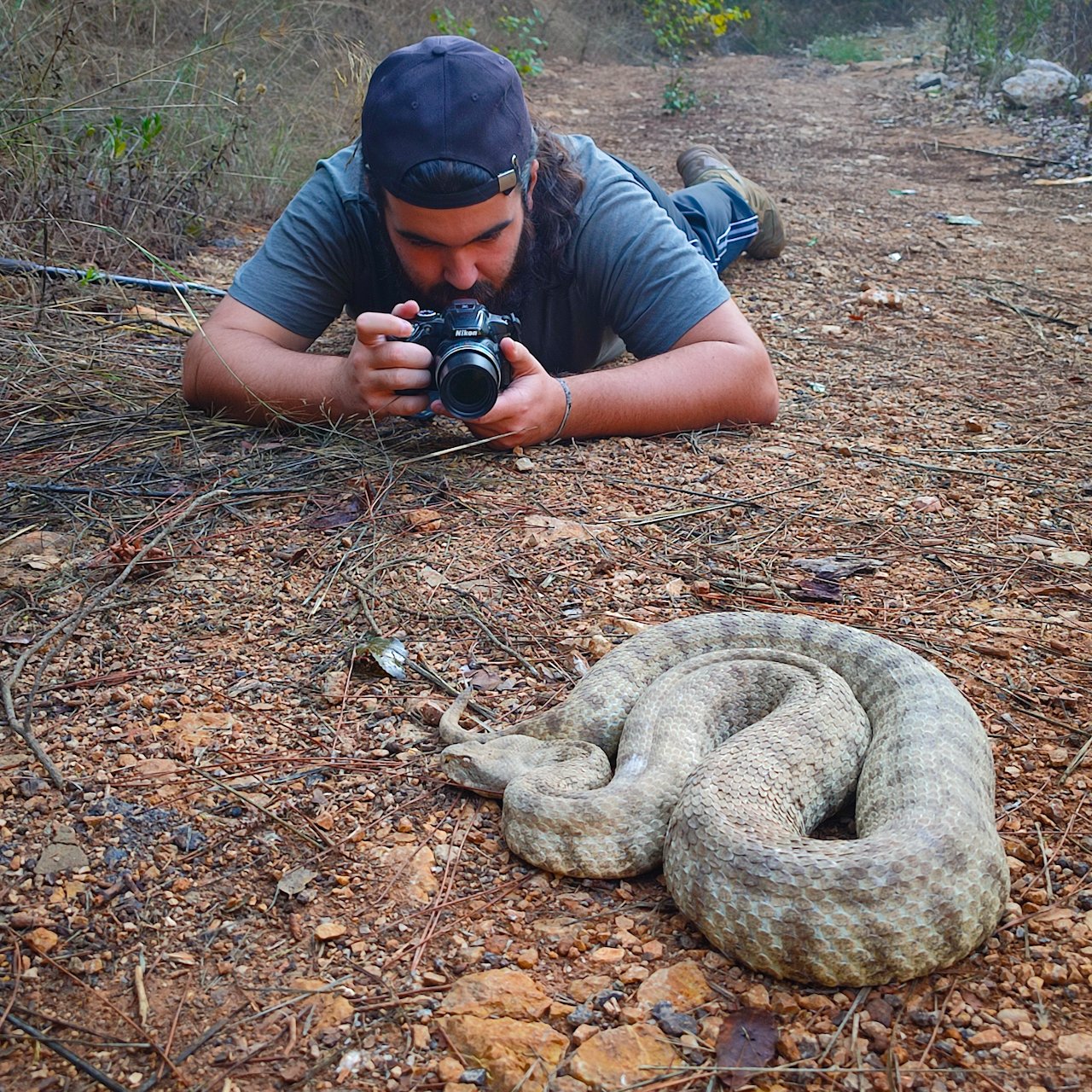 Rami photographing the Blunt-Nosed Viper. (Courtesy Rami Khashab/Lebanese Wildlife)
Rami photographing the Blunt-Nosed Viper. (Courtesy Rami Khashab/Lebanese Wildlife)
The best thing you can do? Stay calm.
An elevated heart rate could accelerate the spread of venom throughout the body, so try not to panic. Take a deep breath — you’ll never drop dead instantly. You have time to locate the nearest hospital, and you should try to get there swiftly but with minimal effort.
If you're in the mountains and are fortunate enough to be hiking with someone who can carry you, let them. The less energy you exert, the better. Another option is to call an ambulance, which can transport you to the hospital while administering first aid.
If you can, wash the wound with soap to remove any residual venom or bacteria.
Interestingly, Lebanon doesn’t develop its own anti-venom; rather, the country’s supply of anti-venom is manufactured at the Scientific Studies and Research Center in Syria, and not all Lebanese hospitals keep it in stock.
However, if you reach a hospital without anti-venom, the hospital staff can still administer life-saving care. Hospital staff will likely administer intravenous fluids, antihistamines and anti-inflammatory medicine to reduce swelling and minimize side effects.
Of course, “it’s simplest not to get bitten,” says Rami. “If you’re careful, if you’re responsible, you should not get bitten.”
Practice self-awareness; check your surroundings. If you’re hiking or working in your garden, wear boots. You can always use a hiking stick to probe the grass before stepping.
If you do come across a snake, don’t try to pick it up.
Harmful misconceptions
Although there is a lot of understandable fear surrounding Lebanon’s venomous snakes, that fear is harming both vipers and non-venomous snakes alike.
“Sadly, given the lack of education and environmental awareness, people kill anything that looks like a snake, so their numbers are declining,” says Rami. “Most non-venomous species suffer from this.”
Rami points to the harmless coin-marked snake, which often gets mistaken for the Palestinian Viper. The coin-marked snake is great for rodent control, but its resemblance to the Palestinian Viper means it is often killed unnecessarily.
 The harmless Coin-marked Snake is often mistaken for the Palestinian Viper . (Courtesy Rami Khashab/Lebanese Wildlife)
The harmless Coin-marked Snake is often mistaken for the Palestinian Viper . (Courtesy Rami Khashab/Lebanese Wildlife)
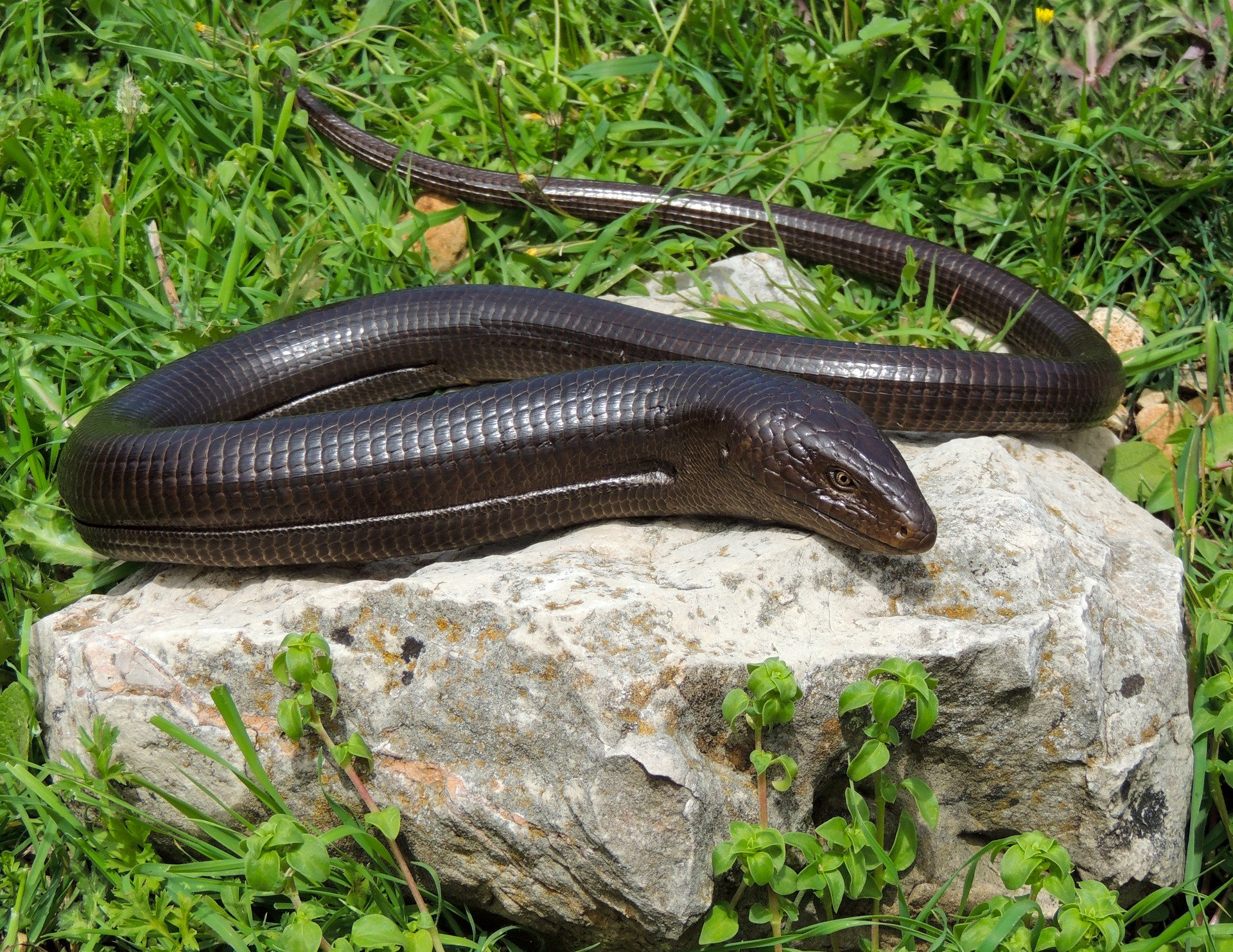 The legless lizard is often killed for its intense looks, despite being completely harmless. (Courtesy Rami Khashab/Lebanese Wildlife)
The legless lizard is often killed for its intense looks, despite being completely harmless. (Courtesy Rami Khashab/Lebanese Wildlife)
“Then there is the poor legless lizard,” says Rami. “It’s not even a snake, but people believe it is very dangerous or very venomous due to its odd looks and tough scales. So they treat it as some sort of monster and kill it. But it is completely harmless; it doesn’t even bite.”
All indigenous reptiles are important to the various ecosystems found throughout Lebanon. Rami wants to educate the public so that fewer and fewer of these creatures are needlessly killed.
If a snake or any other unwanted guest does happen to wander into your home or garden, Rami or another member of Lebanese Wildlife would be happy to come to remove it, he says.
“Our goal isn’t to force people to like snakes, but to respect them and let them live.”
To have a snake or reptile safely removed from your home, contact Lebanese Wildlife at +961 81 770 541 or Rami Khashab at +961 71 316 725